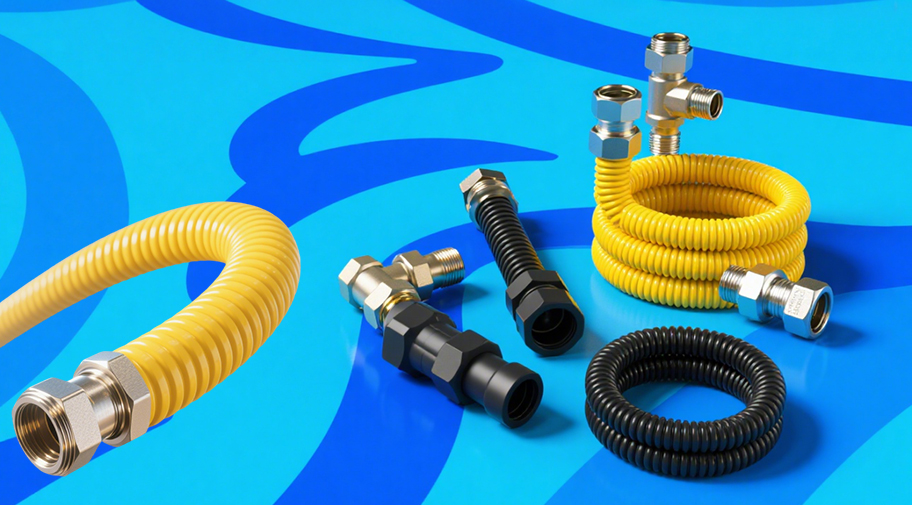-
+86-574-62166708
-
-









Stoves (including household gas stoves, commercial kitchen stoves, industrial furnaces, etc.) have strict requirements for connecting pipelines, such as safety and leakproofness, high temperature resistance, corrosion resistance to gas and its impurities, flexibility for installation, and long-term reliability. Traditional rubber hoses are prone to aging, cracking, and rat bites, while rigid metal pipes lack flexibility, making installation difficult. Stainless steel bellows, with their unique material properties and structural design, can effectively address these pain points and become an ideal choice for stove connection pipelines. The following elaborates on specific application solutions from multiple dimensions.
Core Performance Advantages and Precise Matching with Stove Requirements
The operating environment of stoves is characterized by high ambient temperature (up to 150℃ near the burner), frequent ignition and flameout, contact with gas (natural gas, liquefied petroleum gas) and condensate water, and the need for safe and flexible connection. The performance of stainless steel bellows can accurately meet these requirements:
Excellent Safety and Leakproofness: Made of high-quality 304 stainless steel, the bellows has a one-piece structure with no joints in the middle, reducing the risk of leakage. The connection ends (threaded or quick-connect) are precision machined and equipped with special sealing rings (such as nitrile rubber or EPDM) that are compatible with gas, ensuring reliable sealing even under long-term use and temperature changes.
High Temperature Resistance and Fire Resistance: It can withstand high temperatures up to 300℃, which is far higher than the ambient temperature near the stove burner. Even if it comes into contact with open flames accidentally, it will not melt or burn, avoiding fire accidents caused by hose burning, which is much safer than rubber hoses.
Corrosion Resistance and Gas Compatibility: It is resistant to corrosion from gas components (such as sulfides in natural gas) and condensate water generated during gas combustion, avoiding rust and perforation. It is compatible with various gases, including natural gas, liquefied petroleum gas, and artificial gas, without material degradation or reaction.
Flexibility and Installation Adaptability: The bellows can be bent freely (minimum bending radius is 3-5 times the pipe diameter), adapting to the complex spatial layout of kitchens. It can easily connect the gas source (gas meter, gas cylinder) to the stove, reducing the need for elbows and adapters, and simplifying the installation process.
Anti-aging and Long Service Life: Unlike rubber hoses that are prone to aging, hardening, and cracking due to temperature, ultraviolet rays, and oil fumes, stainless steel bellows have anti-aging performance. Its service life can reach 10-15 years, far exceeding the 18-month to 2-year service life of rubber hoses, reducing the frequency of replacement.
Typical Application Scenarios
Stainless steel bellows can be applied to various types of stoves to solve connection problems:
Household Gas Stoves
Connection between Gas Meter and Stove: In home kitchens, it is used to connect the gas meter or gas valve to the stove. Its flexibility allows it to be routed through cabinets and around obstacles, avoiding the safety hazards of rubber hoses being crushed or kinked.
Built-in Stove Connection: For built-in stoves installed in cabinets, the bellows can be bent into a suitable shape to fit the narrow space, ensuring good ventilation and avoiding gas accumulation.
Commercial Kitchen Stoves
Large-scale Stoves in Restaurants and Canteens: Used to connect commercial stoves (such as wok stoves, steam stoves) with the gas pipeline. It can withstand the high-temperature environment of commercial kitchens and the vibration of stoves during use, ensuring a stable gas supply.
Gas Fryers and Ovens: The high temperature resistance of the bellows makes it suitable for connecting gas fryers and ovens that generate high heat during operation, avoiding pipeline damage caused by high temperature.
Industrial Furnaces
Industrial Heating Furnaces and Annealing Furnaces: Used for gas supply pipelines of industrial furnaces. It can adapt to the high temperature around the furnace and the pressure fluctuations of industrial gas, ensuring a safe and continuous gas supply.
Key Selection Points and Installation Specifications
1. Scientific Selection
Material and Caliber: 304 stainless steel is sufficient for household and general commercial stoves; for industrial environments with more severe conditions, 316 stainless steel can be selected for better corrosion resistance. The caliber is selected according to the gas consumption of the stove, usually DN10 (3/8 inch) for household stoves and DN15 (1/2 inch) or larger for commercial stoves.
Length and Pressure Rating: The length should be appropriate, generally not exceeding 2 meters for household use to avoid excessive pipeline resistance. The pressure rating should be ≥ 1.6MPa to meet the gas supply pressure requirements (usually 2-3kPa for household, up to 5kPa for commercial).
Connection Type: Household stoves commonly use threaded connections with gas-specific nuts; commercial stoves can use flange connections or quick-connect joints for convenient disassembly and maintenance.
2. Installation Specifications
Avoid Over-bending and Twisting: During installation, the bending radius should not be less than the specified value to prevent damage to the bellows structure and affect its service life and safety. Do not twist the pipeline to avoid loosening the seal.
Firm Fixing: The bellows should be fixed with special clips at intervals (every 50-80cm) to avoid shaking and friction with other objects, which may cause wear. Do not pull the pipeline forcibly during installation.
The pipeline should be kept at a distance of at least 30cm from the stove burner and other high-temperature components. If it is unavoidable, heat insulation measures (such as heat insulation sleeves) should be taken.
Leakage Detection: After installation, a leak test must be carried out. Apply soapy water to the connection parts; if no bubbles are generated, it indicates no leakage. Do not use an open flame for leak detection to avoid danger.
Regular Inspection and Replacement: Check the bellows regularly for signs of damage, corrosion, or loose connections. It should be replaced in time when it reaches the service life or is damaged, and must be replaced by professional personnel.
Application Benefits
Improve Safety: The use of stainless steel bellows reduces the risk of gas leakage caused by aging, rat bites, and high temperature of rubber hoses, effectively preventing gas explosions and fire accidents, and ensuring the safety of life and property.
Reduce Maintenance Costs: Its long service life reduces the frequency of replacement compared with rubber hoses, saving the cost and trouble of frequent replacement. At the same time, its corrosion resistance reduces the maintenance work caused by pipeline damage.
Simplify Installation: The flexibility of the bellows makes the installation of stove pipelines more convenient, adapting to various kitchen layouts, reducing the difficulty of construction, and improving installation efficiency.
Comply with Safety Standards: It meets the requirements of national safety standards for gas appliances (such as GB 29993-2013 "Stainless Steel Corrugated Hoses for Gas"), and can pass the inspection of relevant departments, ensuring compliance with regulations.
Summary
Stainless steel bellows, with its safety, high temperature resistance, corrosion resistance, flexibility, and long service life, provides a reliable connection solution for various stoves. It effectively solves the safety hazards and installation difficulties of traditional connection pipelines, and is an ideal choice for improving the safety and reliability of stove gas supply systems.